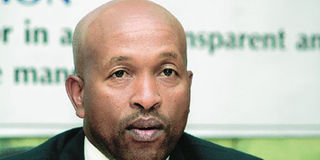Lower fuel prices take effect Wednesday as government denies any shortage

Energy Regulatory Commission Director General, Kaburu Mwirichia. Photo/FILE
The Sh2 price reduction on kerosene and diesel announced by Finance Minister Uhuru Kenyatta a fortnight ago takes effect Wednesday even as the industry regulator announced that a further Sh5 cut announced by Prime Minister Raila Odinga would take time before coming into play.
At the same time, the government has maintained that there is enough fuel in the country.
Energy minister Kiraitu Murungi on Wednesday down-played any talk of a possible fuel crisis while ruling out any pump price hike.
“What we experienced a few days ago is a delay by operators to get super petrol and diesel from the Kenya Pipeline system and not a shortage,” said Mr Kiraitu.
Energy Regulatory Commission, the industry regulator, said that the prices are to be effected at pump stations across the country as part of the government’s plan to cushion consumers.
“The Sh2 is the maximum waiver allowed to the Minister of Finance, the remaining Sh5 will have to wait approval of Parliament before we pass the same to the consumers,” said Mr Kaburu Mwirichia, the commission’s director general at a press conference in his office in Nairobi.
In the new deal, kerosene will retail at Sh88.73 in Nairobi, Sh85.53, Sh89.81 and Sh90.92 in Mombasa, Nakuru and Kisumu respectively.
Diesel on the other hand will be sold at Sh105.44 in Nairobi, Sh102.20 in Mombasa and Sh106.53, Sh107.64 in Nakuru and Kisumu respectively.
While consumer federations have demanded for a further reduction of prices of petroleum products, the ERC has maintained that it can only do as much.
The regulator has tried to defend its price capping formula introduced in the market in December 2010 with little success.
It insists that the taxes charged on products profit margins and distribution costs have remained constant in the period.
Cost of the product
“It is the cost of product that has been increasing over the last five months and these are as a result of the movements in the international markets. These have gone up by about 40 per cent globally,” said Mr Mwirichia.
Under the regulated pricing framework, pump prices are reviewed every 30 days by the regulator based on previous month’s averages.
It is then computed on fixed taxation and margins both at wholesale and retail outlets.
The ERC said Kenyan consumers are still paying relatively cheaper prices for petroleum products compared to their Tanzanian and South African counterparts.
Mr Kiraitu said the country experienced a “temporary hitch” due to failure by oil marketers to pay for petroleum products, a situation he attributed to banks not opening on Sunday and Monday.
The two days fell on the Labour Day holiday.
“The operators did not pick the products as they had not paid for them but the situation will return to normal any time soon,” he said.
On Monday, a majority of petrol stations especially in Nairobi had run out of the fuel creating panic over a possible shortage that could trigger a price increase.
Any rise will add more stress to the already strained consumer who is struggling with the high cost of living.
The minister spoke after briefing the media on a tour of a delegation from Rwanda which is in the country to learn about geothermal energy.




